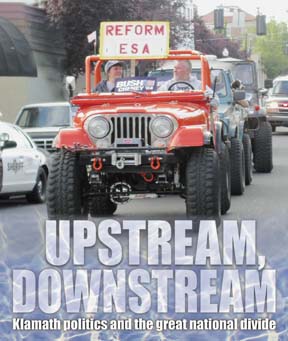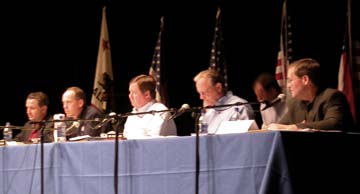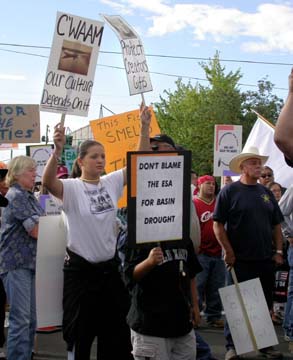 
July 29, 2004
IN
THE NEWS | PUBLISHER | THE HUM | PREVIEW | CALENDAR

Cover photo: Klamath Falls,
Ore. area farmers and ranchers
voice their opinions on the Endangered Species Act (ESA)
in advance of a July 17 Congressional hearing in the town.
story & photos by HANK SIMS
ON JULY 17, FARMERS AND RANCHERS
from the area surrounding Klamath Falls, Ore., gathered to welcome
the United States Congress to that small town. Some came on horseback,
carrying Confederate flags or the Stars and Stripes. Others paraded
to the center of town in their off-road vehicles. Others simply
marched on foot, waving signs that championed their way of life
and denounced those who would seek to meddle in their affairs.
![[people marching with signs "fix the ESA now" and "Bush Cheney, Farm & Ranch Team"]](cover0729-esa.protestors.jpg) Barry
Bushue, president of the Oregon Farm Bureau, stood before a podium
in front of the Ross Ragland Theater to pump up the crowd on
the issue that brought five members of Congress, all Republicans,
to Klamath Falls that morning -- the 1973 Endangered Species
Act (ESA), which Bushue called an "outmoded law that has
accomplished little more than decades of unnecessary pain and
harm." Barry
Bushue, president of the Oregon Farm Bureau, stood before a podium
in front of the Ross Ragland Theater to pump up the crowd on
the issue that brought five members of Congress, all Republicans,
to Klamath Falls that morning -- the 1973 Endangered Species
Act (ESA), which Bushue called an "outmoded law that has
accomplished little more than decades of unnecessary pain and
harm."
"Klamath Falls has become
an unwilling poster child for the failure of an Endangered Species
Act that impacts all of us," he said. "The Act is a
colossal failure, yet we continue to put people out of business,
pour money down rat-holes and get no results."
The Klamath River is a 250-mile
umbilical cord connecting liberal Humboldt County with a little
piece of red-state America. Just as people downstream remember
the fish kill of 2002, in which nearly 35,000 salmon died on
the banks after being stranded in the river's first few miles,
the farmers in the Klamath Basin -- the upstream agricultural
community -- remember 2001. In that dry year, water from the
Klamath was denied to upstream irrigators after regulatory agencies
determined that three endangered or threatened fish -- including
the Klamath's run of coho salmon, which was listed as a threatened
species in 1997 -- would be impacted by low flows. Calls to reform
or do away with the ESA have been emanating from Klamath Falls,
the political center of the basin, ever since. And politicians
have been listening. [See Klamath basin
map at end of article]
![[woman on horseback with confederate flag, other woman on horse with other fmag]](cover0729-confederateflag.jpg)
Defend farmers,
defend Bush
As Bushue spoke, the Ragland
Theater was preparing to host a hearing conducted by the House
Committee on Resources, the body in the House of Representatives
that sets the agenda for legislation concerning mining, forestry,
water and other natural resources. The committee was considering
two pieces of legislation that would reform the ESA, one of them
authored by Greg Walden, Klamath Falls' representative in Congress.
![[Ragland Theater facade, with 4-H kids holding American flags]](cover0729-ragland.jpg) "Winning
passage of this legislation would be a tremendous victory, and
the culmination of years and years of hard sacrifice," the
Farm Bureau's Bushue continued. "But it will be all for
naught if we don't have someone in the White House who understands
the devastation and heartbreak caused by this draconian law and
the need for its reform -- someone with a proven record of leadership,
passion and commitment to our natural resources, environment
and agriculture. We have that someone in the White House in George
W. Bush. We know that we can count on President Bush to help
family farmers and rural America. He is counting on each and
every one of us to do our part between now and the November election." "Winning
passage of this legislation would be a tremendous victory, and
the culmination of years and years of hard sacrifice," the
Farm Bureau's Bushue continued. "But it will be all for
naught if we don't have someone in the White House who understands
the devastation and heartbreak caused by this draconian law and
the need for its reform -- someone with a proven record of leadership,
passion and commitment to our natural resources, environment
and agriculture. We have that someone in the White House in George
W. Bush. We know that we can count on President Bush to help
family farmers and rural America. He is counting on each and
every one of us to do our part between now and the November election."
As Bushue's speech made clear,
that day's congressional meeting may have had other purposes
than ESA reform, which is a long-term project unlikely to gain
much traction soon. The House Committee on Resources approved
the two proposed amendments to the ESA on July 21, sending them
to the floor of the House of Representatives for a full vote.
Though many believe that they stand a good chance there, even
the committee's chairman, California Rep. Richard Pombo (R-Tracy),
admitted last week that they are unlikely to be approved by the
current Senate.
It wasn't that the farmers desperately
needed the reforms at this time, anyway. Since 2002, Klamath
water has been managed under a 10-year plan that firmly favors
agricultural interests.
But there were few issues as
likely to energize this particular crowd in an election year,
when Republicans need all the Oregon votes they can get. In 2000,
Vice-President Al Gore won the state by fewer than 7,000 votes
-- a margin of less than a half of a percentage point -- and
Republicans in the state and in Washington, D.C., would obviously
like to see that margin reversed in a race as tight as this year's.
This wasn't the first time the Klamath and the various constituencies
that depend upon it were being asked to play a role in national
politics.

Left to right: Representatives
Wally Herger (R-CA), Greg Walden (R-OR),
Ken Calvert (R-CA), George Radanovich (R-CA) and John Doolittle
(R-CA)
Withering crops
In 2001, the National Marine
Fisheries Service (NMFS) and the U.S. Fish and Wildlife Service
(USFW) reviewed a plan for water rationing on the Klamath and
decided that it would place the coho salmon as well as two upstream
fish species in jeopardy. The opinions forced the Bureau of Reclamation,
which manages Klamath water flows, to cease delivery of water
to farmers in the Klamath Basin, and spawned a flurry of national
attention. Farmers stormed the gates holding the water back and
attempted to forcibly pry them open. Klamath crops -- alfalfa,
barley, potatoes -- withered in the fields.
On a swing through Oregon the
following January, President Bush addressed the subject directly.
"We'll do everything we can to make sure water is available
for those who farm," he said.
The Wall Street Journal
later reported that Karl Rove, the president's political advisor,
had met with senior managers at the U.S. Department of Interior
-- which oversees the Bureau of Reclamation -- shortly after
Bush's Oregon visit. Rove reportedly spoke to them about political
considerations in the state of Oregon, and talked about the importance
of Klamath water to local farmers.
When a NMFS biologist prepared
an opinion that showed that the fish faced similar problems in
2002, he was told that it was unacceptable and was ordered to
revise it. He later withdrew from the project, charging political
interference with his work, and eventually quit his job (see
"The Klamath Whistleblower,"
Nov. 13, 2003). That April, Interior Secretary Gale Norton
personally came to Klamath Falls to inaugurate the new water
regime. The fish kill followed in the fall.
"The things we've seen
here in the basin have given me a great passion to try to fix
this law -- to fix it so that it works for the people and to
fix it so it works for the species," Rep. Walden said at
the opening of the hearing to a crowd of about 500 in the Ragland
Theater. [Walden in photo
below left]
![[Greg Walden]](cover0729-gregwalden.jpg) Walden's
bill -- called "Sound Science for Endangered Species Act
Planning" -- seeks to eliminate provisions of the act that
led to the shut-off of water to Klamath Basin farmers in 2001.
In particular, it would require that decisions made pursuant
to the ESA, such as whether to list a species as endangered or,
as in the Klamath case, to issue an opinion that would require
a change in action in order to protect a species, to undergo
"peer review." Walden's
bill -- called "Sound Science for Endangered Species Act
Planning" -- seeks to eliminate provisions of the act that
led to the shut-off of water to Klamath Basin farmers in 2001.
In particular, it would require that decisions made pursuant
to the ESA, such as whether to list a species as endangered or,
as in the Klamath case, to issue an opinion that would require
a change in action in order to protect a species, to undergo
"peer review."
Under Walden's legislation,
a theoretically independent panel of scientists would review
opinions like those generated by National Marine Fisheries and
U.S. Fish and Wildlife in 2001. But critics of the bill note
that the panel would be appointed by the Secretary of the Interior,
who is in turn appointed by the president. This leads many to
fear a further politicization of science, something that has
already caused concern among scientists as well as opposition
legislators under the Bush administration.
Earlier this month, the Union
of Concerned Scientists released a report documenting numerous
cases of scientists being subjected to "litmus tests"
before being allowed to serve on scientific advisory panels.
In particular, two distinguished scientists who were being considered
for posts on the National Advisory Council for Human Genome Research
reported that they were asked what they thought of President
Bush and the current administration's policies.
Peer review would also require
that scientists use only empirical data collected from the field,
rather than computer modeling of a population -- which some scientists
say would tie their hands when decisions have to be made relatively
quickly in order to protect a species.
![[John Doolittle]](cover0729-doolittle.jpg) But
for some of the speakers and many of the farmers attending the
congressional hearing, such concerns were nothing compared to
their strong desire to punish the law that harmed them in 2001.
Rep. John Doolittle (R-Roseville) [photo
at right] who represents some Klamath
Basin farmers on the California side, took a hard line at the
Klamath Falls hearing. Doolittle decried such mediated solutions
as the Klamath "water bank" -- a federal buyback of
water rights from willing farmers -- and scolded employees of
USFW and NMFS for their 2001 opinions that mandated higher flows
to protect the fish. But
for some of the speakers and many of the farmers attending the
congressional hearing, such concerns were nothing compared to
their strong desire to punish the law that harmed them in 2001.
Rep. John Doolittle (R-Roseville) [photo
at right] who represents some Klamath
Basin farmers on the California side, took a hard line at the
Klamath Falls hearing. Doolittle decried such mediated solutions
as the Klamath "water bank" -- a federal buyback of
water rights from willing farmers -- and scolded employees of
USFW and NMFS for their 2001 opinions that mandated higher flows
to protect the fish.
"As the people's elected
representative in one congressional district for the state of
California, I would urge you to do everything you can to err
on the side of the people who live here," Doolittle said,
to gathering excitement. "If you have to make a choice that
either benefits the people or the species, and you have that
discretion, err on the side of the people! After all, God created
the Earth for men and women."
The cheers that shook the Ragland
Theater following Doolittle's speech dwarfed those given to the
more measured comments offered by Walden or the other representatives.
![[men on panel, behind long table]](cover0729-fletcher.jpg)
Left to right: Jimmy Smith,
Bill Gaines of the California Waterfowl Association,
Curry County (Ore.) Commissioner Ralph Brown, Allen Foreman,
Troy Fletcher
 ![[tribal members holding signs saying "save the ESA"]](cover0729-tribalsigns.jpg)
Above: Klamath tribal members at the rally in Klamath Falls.
Another fish kill?
Little mention was made of the
fish kill at the Klamath Falls hearing. "The Klamath tragedy,"
a phrase used frequently that day, referred exclusively to the
2001 shut-off. Given the makeup of the subcommittee, two local
leaders invited to testify before the commission -- Supervisor
Jimmy Smith, a former commercial fisherman, and Troy Fletcher,
executive director of the Yurok Tribe -- could hope only to interject
some measure of consciousness about the plight of tribes and
fishermen.
![[coho salmon underwater]](cover0729-coho.jpg) Speaking
as a representative of the Klamath River Inter-Tribal Fish and
Water Commission, Fletcher said that from the tribes' point of
view the ESA was not doing nearly enough. The federal government,
he said, had the legal responsibility to maintain tribal resources,
including the Klamath and its fish. Speaking
as a representative of the Klamath River Inter-Tribal Fish and
Water Commission, Fletcher said that from the tribes' point of
view the ESA was not doing nearly enough. The federal government,
he said, had the legal responsibility to maintain tribal resources,
including the Klamath and its fish.
"With regard to the specific
application of the Endangered Species Act in the Klamath Basin,
it's important to note that the goals of the ESA fall way short
of implementing the United States' solemn commitments to Native
people in the basin," Fletcher said.
Smith said that although Humboldt
County was dedicated to preserving agricultural land -- a dedication
he said extended to its neighbors upstream -- the loss of salmon
stocks over the years has taken a devastating toll on a once-thriving
local industry. [above
right: coho salmon]
In the third year of the Bureau
of Reclamation's 10-year management plan for the Klamath, the
problems of 2002 may now be set to repeat themselves. Denver
Nelson, a retired McKinleyville neurosurgeon who devotes his
time to researching local rivers, has noticed that water levels
at the mouth of the Klamath have recently bottomed out at 2002
levels -- an ominous sign. [See chart
at end of article]
"This year, I believe,
we're headed for a fish kill year," Nelson said. "You
can't have full allotments of water for everybody. That's the
bottom line."
In the coming weeks, the lower
levels could force supporters of Walden's bill into a game of
chicken with their theory -- based on a report that served as
the model for the "sound science" proposal -- that
low flows were not to blame for the 2002 fish kill. Unless more
water is released into the river -- either from the Klamath dams
or from Lewiston Dam on the Trinity River, a major Klamath tributary
-- the Republican Party will be moving into August and September
flirting with the risk of yet another mass salmon die-off on
the television news.
After the hearing had ended,
Smith made a special point of going up to Doolittle -- the committee
member who had displayed the least concern for the fishermen
and the tribes -- to thank the congressman for hearing his testimony.
Smith said later that he wanted Doolittle and his supporters
to know that he could be trusted to negotiate in good faith.
"The solution is going
to take cooperation with the people in the Klamath Basin,"
he said. "I want to be there, and I hope they have the confidence
to invite me back."
Many of the Klamath Basin farmers
appeared receptive to a solution based on negotiations with their
counterparts downstream. Organizers of the rally before the hearing
invited the Yuroks' Troy Fletcher and Allen Foreman, chairman
of the Klamath Tribe, to address the crowd; when the tribal representatives
didn't come off as radicals looking to end the farmers' way of
life, they respectfully listened and even applauded.
But if upstream and downstream
are to come together to solve their differences, the Klamath
will have to be relieved of its duties as a political symbol
-- a river that divides communities instead of uniting them.
Klamath River Basin
![[map showing Klamath River, various damns, lakes, reservoirs, highways, and Oregon/California border]](cover0729-klamathmap.jpg)
Map adapted from file
graphic by Robert Britt, Souce: U.S. Bureau of Reclamation
![[Chart of Klmath Glen Flows, 1920 to 2004, showing significant drop below mean levels]](cover0729-klamathflowschart.jpg)
IN
THE NEWS | PUBLISHER | THE HUM | PREVIEW | CALENDAR
Comments?

© Copyright 2004, North Coast Journal,
Inc.
|